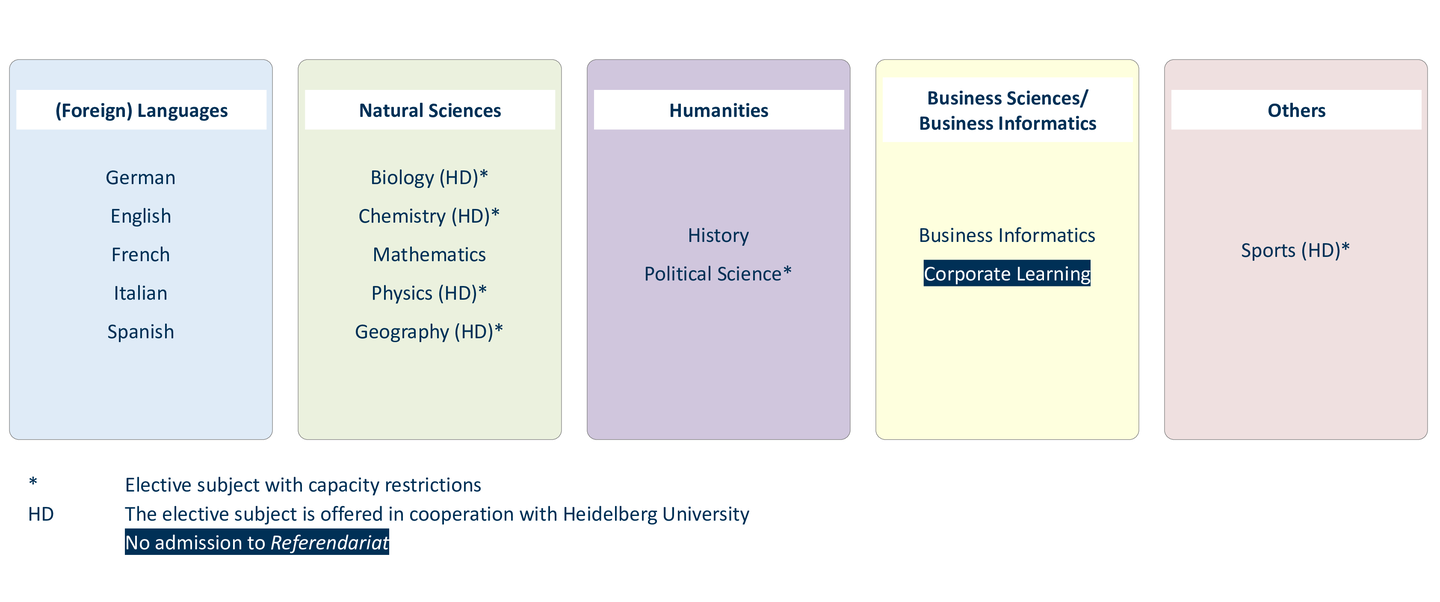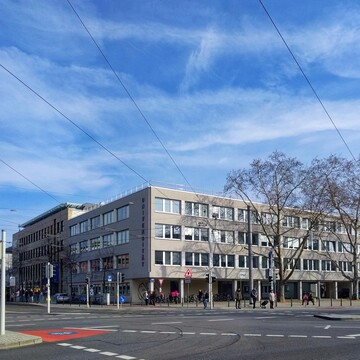Bachelor's Program in Economic and Business Education
Program facts and information
Degree: Bachelor of Science (B.Sc.)
Standard period of study: 6 semesters (= 3 years)
ECTS credits: at least 180
Language of instruction: German, some courses are taught in English
Language requirements: A good level of English proficiency is recommended; no proof of language proficiency is required.
If you are not a German citizen or do not have a German university entrance qualification (Abitur or equivalent school leaving certificate), you must prove German language proficiency at C1 level.Program start: Fall semester (September)
Academic calendarSchool: Business School
Semester fee: EUR 194 (more information)
Tuition fees for international students from non-EU countries: EUR 1,500
Tuition fees for a second degree: no additional fees (exception: students with Corporate Learning as an elective subject)Program overview
Developing a general understanding of the subject material is at the heart of the bachelor's program.
This includes looking at national and company-related economic problems, and aspects of business law, economic law, and business informatics.
Another focus is on the economic and business education. Students deal with questions such as: “Under what conditions do students acquire economic skills?” or “How can learning environments in companies and commercial schools be designed in a meaningful way?” In order to address these questions in a scientifically sound manner, students acquire methodological and analytical skills in courses on research methods and statistics and learn how to conduct scientific studies.
The studies are complemented by internships in companies and schools as well as a wide range of elective subjects.
 Credit: Marie Fox
Credit: Marie FoxWhy study Economic and Business Education at the University of Mannheim?
In Mannheim, you will study at one of the most renowned economic institutions in Europe. Whether CHE, FT Ranking or THE – independent rankings repeatedly confirm the outstanding quality of research and teaching in national and international comparison.
The Business School of the University of Mannheim has been accredited by three accreditation agencies, earning itself the internationally sought-after triple crown. The three most significant accreditation agencies, AACSB International (Tampa, USA), EQUIS/
EFMD (Brussels, Belgium), and AMBA (London, UK) have all confirmed the top quality of the study conditions in Mannheim. The Business School also maintains a global network with over 200 partner universities, offering students excellent opportunities for international exchange.
The bachelor's program in Economic and Business Education offers a wide range of exercise courses, tutorials, working groups and coaching to accompany lectures and seminars, as well as the opportunity to choose from a comprehensive range of elective subjects. The University of Mannheim also achieves top rankings in national and international comparisons in many of the departments that students get to know as part of their elective subjects. In some elective subjects, the University of Mannheim cooperates with Heidelberg University.
Career opportunities
With a degree in Economic and Business Education, graduates can work at schools or outside the school sector.
Outside the school sector, graduates are well prepared for positions in companies and can be found in all areas of business practice. They take on responsible tasks not only in personnel development or educational counseling, but also in areas such as Marketing, Finance, or Consulting – similar to graduates of traditional business studies.
They have all elective subjects available to them in order to tailor their qualifications to their individual needs. For those who already want to prepare themselves specifically for a corporate career, the elective subject Corporate Learning is a special opportunity to expand knowledge in a targeted manner for the corporate context. It enables a greater focus on business-relevant topics, such as workplace learning.
For the school sector, the bachelor's degree provides the basis for the master's program in Economic and Business Education. With the master's degree and subsequent Referendariat, graduates can become teachers at vocational schools. This school-based career path is possible with all elective subjects – except for corporate learning.
A master's degree also qualifies you to pursue a doctoral degree (also part-time) in the corresponding subject.
Required interests and skills
Students of Economic and Business Education should
- be interested in working on questions related to economics and teaching,
- be capable of critical thinking and working,
- enjoy teaching and learning in companies or at schools,
- enjoy working with academic literature,
- have good knowledge of math and English.
Program structure
Degree plan
The degree plan (PDF, 279 kB) provides an overview of the courses in the different semesters.Studying abroad
The International Office and the Business School can advise you on planning a semester abroad. A period of study abroad is not mandatory for students of this program, and usually extends the duration of your studies.Internships
Students in the bachelor's program in Economic and Business Education complete two mandatory internships. These are prepared for and accompanied by seminars.- Students with elective subjects except for Corporate Learning(one school internship and one company internship):
The school internship – at a vocational school in Baden-Württemberg – lasts two weeks and takes place between the fifth and sixth semester. You can complete the company internship in various areas of a company. It lasts for eight weeks and takes place between the fourth and fifth semester. - Students with the elective subject Corporate Learning (two company internships):
The internship remains unchanged – eight weeks between the fourth and fifth semester. However, instead of the two-week school internship, you will complete an additional two-week internship in a company to deepen your focus on the non-school sector.
Sample course schedule
This is how your course schedule (PDF, 200 kB) for the first semester could look like.- Students with elective subjects except for Corporate Learning(one school internship and one company internship):
Continuing Education
Certificate programs
Strengthen your potential, deepen your knowledge, find solutions for challenges we will face tomorrow – there are many good reasons to think outside the box, get to know and try out new things even during your studies.At the University of Mannheim, you can do this in the “Studium Oecologicum” which focuses on sustainability. In our certificate program, you will acquire interdisciplinary expert knowledge which can help you to act ethically and to make holistic decisions.
Language courses
Making language learning easier: No matter if you want to learn Japanese, Hebrew, Spanish or Norwegian, take the Graduate Record Examination Test (GRE), The European Language Certificates (telc) or the TOEFL test – each semester, the University of Mannheim offers language courses and language certificates in more than 16 languages for students and non-university members, online and on campus!Studium Generale
Are you interested in IT or communication trainings or theater, music, or drawing courses? Studium Generale has a vast range of courses available to all.Further study
The following degree program is partly or fully available in English:
Mannheim Master in Management (M.Sc.)
The following degree program is (mainly) taught in German:
Application and selection
At the University of Mannheim, a traditional numerus clausus (within the meaning of a minimum grade required for admission) does not exist. In our selection process, we take numerous criteria into account. For more details, please check the selection statutes (see below). Be bold! Please do not hesitate to contact us if you need advice. We are looking forward to receiving your application!
Admission for the bachelor's degree in Economic and Business Education is currently not selective, i.e. you are guaranteed a study place if you meet the admission requirements and apply in due time and form.
The following admission requirements must be met:
- proof of a university entrance qualification,
- proof of German language proficiency
(If you are not a German citizen or do not have a German university entrance qualification (Abitur or equivalent school leaving certificate), you must prove German language proficiency at C1 level) - Certificate of attendance for the orientation test for teacher education programs for prospective students of the Ministry of Science, Research and Arts of Baden-Württemberg (to be uploaded when enrolling)
- Certificate of attendance for the aptitude test (to be uploaded when enrolling)
Selection statutes
Under “Application and selection” we have compiled the most important selection criteria of the program for you. For more detailed explanations of the selection process and the legally binding requirements of the degree program, please refer to the selection statutes.Scholarships and funding
The university offers various funding opportunities. Around 200 Mannheim students receive scholarships every year, which are intended to give them the freedom to focus on their academic achievements or to continue their voluntary work alongside their studies. Find out more about the funding opportunities and feel free to apply, for example, for the Deutschland Scholarship, the Opportunity Mannheim Scholarship or the Elite Sports Scholarship Rhine-Neckar Metropolitan Region.Funding opportunities for international degree-seeking students
Application
- The application deadline for our bachelor's programs for the fall semesters starts on 1 June and ends on 15 July.
Contact

Clara Vonhof, M.Sc.
L 4, 1 – Room 001 (ground floor)
68161 Mannheim
Please note: Only online consultations are offered currently. Please make an appointment at https://www.bwl.uni-mannheim.de/online-beratung/studiengangsmanagementwipaed/

Admissions Office
L 1, 1 – Room 157, 158
68161 Mannheim
Isabella Heppting, M.A.
L 9, 7
3rd floor – Room 302
68161 Mannheim




